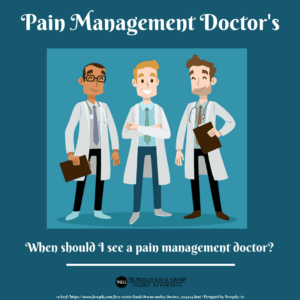Pain Management Doctors
This article discusses pain management doctors in some detail focusing on the injuries they treat.
What is it?
Pain management doctors specialize in the diagnosis, evaluation, and treatment of all different kinds of pain. There are many types of pain such as cancer pain (tumor pressing on parts of the body causing pain), chronic pain (long-term pain), and acute pain (short-term pain). The overall goal of pain management doctors is to manage pain and provide comfort to their patients. They do this in a variety of ways.
What types of injuries do they treat?
There are many types of injuries that pain management doctors treat. Below are some injuries and common pain types that are treated:
- Back pain
- Constant headaches/migraines
- Joint pain
- Post-surgery pain
- Arthritis
- Chest/abdominal pain
- Sports injuries
The above list is not limited; there are plenty of other types of pain and injuries that pain management doctors treat.
What types of treatment do they provide?
The treatment they provide can range from injections to therapy. Here is a list of some common types of treatment provided by pain management doctors:
- Spinal injections
- Steroid Injections
- Nerve blocks
- Joint Injections
- Radiofrequency ablation
- Neuromodulation
The above list is not complete because there are other forms of treatment that pain management doctors provide. The overall goal of pain management doctors is to treat pain and approach pain to satisfy the patient’s comfort level.
Chronic Pain
Chronic pain is a type of pain that is persistent and can last well over 6 months to many years. Usually, chronic pain occurs after an injury or surgery, but the pain simply doesn’t seem to go away. There are many ways to approach chronic pain, but sometimes the treatment only takes the edge off.
When you feel pain, there are pain receptors that are turned on in that area. The pain receptors send an electrical signal to your brain which tells you that you are hurting. When the body heals itself or the injury is healed, the pain receptors turn off and stop sending those electrical signals to your brain. With chronic pain, however, those pain receptors continue sending the pain signals even after the injury is healed. Some of the leading causes of chronic pain are:
- Back injuries
- Surgery
- Headaches and migraines
- Arthritis
When someone feels pain from an injury or a symptom well after the body is healed, that person may be suffering from chronic pain. Chronic pain can also affect someone mentally; the can feel constantly frustrated, angry, or depressed. It can also affect sleeping patterns, eating habits, and drain your energy. When our expectations aren’t met, we feel frustrated. We can feel frustrated when we don’t know why something is happening. When someone has chronic pain it can be difficult to manage because that person may not know why they are in such pain or struggle to find a solution to the pain.
Seeing pain management doctors or primary care physicians would be the next step for managing the pain.
Cancer Pain
Cancer pain is daunting to think about, let alone deal with first hand or even personally. Cancer is a word that is not used lightly and should be handled properly. When someone has cancer, there can be a tumor building inside of that person’s body. Cancer pain usually refers to the pain caused by the tumor pressing against nerves, bones, muscles, or organs in the body. This type of pain is hard to manage because of the knowledge. Knowing you have cancer is painful enough, let alone the actual pain from a tumor.
One of the most helpful treatments besides drugs and chemotherapy is an emotional connection with friends and family. Cancer can take a toll on your mental and physical health, so it is important to take care of both.
Acute Pain
When someone has an injury or surgery, they usually experience some level of pain. When the pain goes away when that person is healed, that person experienced acute pain. Acute pain usually doesn’t last over 6 months. Some examples of things that cause acute pain are:
- Surgery that causes pain for only a month
- A headache that doesn’t last for more than a few hours
- A broken bone that heals after two months
- Cut that heals after a week
- A bruised rib that heals after 3 weeks
There are plenty of other types of injuries or surgeries that cause acute pain. Treatment with drugs usually relieves the pain but does not fix the injury.



